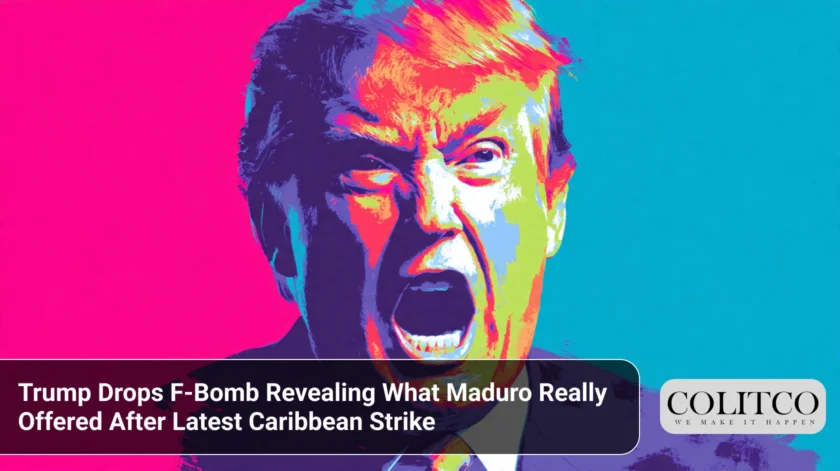President Donald Trump confirmed on Friday what many suspected but few could prove: Venezuelan leader Nicolás Maduro has offered substantial concessions to avoid further U.S. military action. The admission came during an Oval Office meeting with Ukrainian President Volodymyr Zelenskyy, just hours after the sixth U.S. strike on alleged drug vessels in the Caribbean.
When asked by reporters if Maduro had offered concessions including natural resources, Trump responded bluntly: “He has offered everything. You’re right. You know why? Because he doesn’t want to f**k around with the United States.”
The profanity-laden confirmation follows months of secret diplomatic negotiations that collapsed last week, according to multiple sources familiar with the talks.
FAFO. pic.twitter.com/Zh9v18ynzy
— The White House (@WhiteHouse) October 17, 2025
The Strike That Changed Everything
The latest U.S. narco-sub strike occurred Thursday in international waters off Venezuela’s coast. Unlike previous operations that killed all aboard, this strike reportedly produced survivors who were seized by U.S. forces.
Trump described the target as “a drug-carrying submarine built specifically for the transportation of massive amounts of drugs.” Secretary of State Marco Rubio indicated more details would be released soon.
Since early September, the U.S. military has conducted six strikes on vessels alleged to be trafficking narcotics from Venezuela. The operations have killed approximately 30 people whom the administration labels “narcoterrorists.”
Critics, including legal analysts and Venezuelan officials, contend the strikes violate international law since drug traffickers are not combatants in a declared military conflict.
Venezuela’s Resource Gambit Revealed
According to The New York Times, Maduro’s government offered the Trump administration a dominant stake in Venezuela’s vast resource wealth during months-long negotiations.
The sweeping proposal included:
- Opening all existing and future oil and gold projects to American companies
- Granting preferential contracts to U.S. businesses
- Reversing oil export flows from China to the United States
- Slashing energy and mining contracts with Chinese, Iranian and Russian firms
- Access to Venezuela’s coltan, lithium and rare earth deposits
Venezuela holds the world’s largest proven oil reserves at approximately 300 billion barrels. The country also possesses substantial gold deposits and critical minerals essential for technology manufacturing.
Opposition leader María Corina Machado, who recently won the Nobel Peace Prize, presented an alternative proposal claiming American companies could earn up to USD 1.7 trillion over 15 years under a democratic transition.
Why Washington Said No
Despite Venezuela’s extensive concessions, the Trump administration rejected the offer and severed diplomatic contacts with Caracas last week. The decision effectively killed the deal, at least temporarily.
The sticking point: Maduro’s political future.
Venezuelan Foreign Minister Yván Gil stated unequivocally that “the president will not negotiate his departure.” This red line proved insurmountable for an administration that views regime change as essential to regional stability.
Secretary of State Marco Rubio has emerged as the leading voice pushing for Maduro’s removal. The Florida senator of Cuban descent considers the Venezuelan leader’s fall crucial to weakening Havana’s communist regime.
Richard Grenell, Trump’s special envoy who conducted the negotiations, advocated for continued diplomacy. But Rubio’s hardline approach ultimately prevailed.
Escalating Military Pressure
The U.S. has deployed eight warships, multiple surveillance aircraft, MQ-9 Reaper drones and an attack submarine to the southern Caribbean since July. This represents the most significant American military buildup in the region in decades.
Trump recently authorised the CIA to conduct covert operations inside Venezuela, according to multiple reports. U.S. military officials are drawing up options for strikes within Venezuelan territory, potentially beginning within weeks.
Venezuela has responded by activating “Independence Plan 200,” conducting military drills and displaying Russian-built fighter jets. Maduro claims to have mobilised millions of militiamen in preparation for potential U.S. intervention.
The Venezuelan government requested an emergency UN Security Council session, accusing Washington of using drug trafficking as a pretext for resource seizure and regime change.
A speech they won’t show you on US corporate media:
Venezuela’s🇻🇪 President Nicolas Maduro blasts the Trump Administration for approving CIA operations in Venezuela to attack his government, and lists just a few examples of US-backed coups in Latin America pic.twitter.com/X5Vxak9jef
— Going Underground (@GUnderground_TV) October 17, 2025
The Critical Minerals Dimension
The dispute highlights growing competition for critical minerals essential to clean energy transitions and advanced manufacturing. Venezuela’s lithium, coltan and rare earth deposits have become increasingly strategic as nations seek to reduce dependence on Chinese supply chains.
The U.S. has prioritised securing alternative sources of critical minerals for electric vehicle batteries and defence applications. Maduro’s offer would have provided substantial American access to these resources.
However, experts note that Venezuela plays a minimal role in actual drug trafficking to the U.S., with most cocaine transiting through other routes. This has fuelled speculation that narcotics enforcement serves as cover for broader geopolitical objectives.
Also Read: Trump’s Former National Security Adviser Faces Serious Criminal Charges in Latest Political Drama
What Happens Next
Qatar is attempting to mediate between the two countries, though Trump administration officials have largely dismissed these efforts in favour of continued military pressure.
Gold prices, already elevated by geopolitical tensions, could see additional support if Venezuelan instability disrupts regional commodity flows. The country’s oil production, though reduced from historical levels, still influences global energy markets.
Key catalysts to watch:
- Potential U.S. strikes inside Venezuelan territory
- Further diplomatic initiatives through Middle Eastern intermediaries
- Venezuela’s response to continued military pressure
- Congressional reactions to the administration’s use of force
Trump’s explosive confirmation of Maduro’s concessions marks a pivotal moment in Caribbean geopolitics. Whether through negotiation or confrontation, the resolution will shape resource access, regional security and great power competition for years to come.
The administration maintains its stance that Venezuela operates as a “narco-terror cartel” requiring military response. Meanwhile, Caracas insists it remains open to dialogue while preparing for potential conflict.
As one U.S. official told NBC News: the goal is forcing Maduro to make “rash decisions that could ultimately lead to him being ousted without American boots on the ground.”












